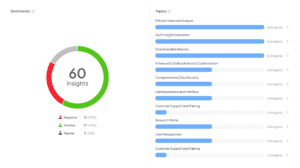Top 5 AI Tools to Analyze Interview Transcripts in 2025
-
Odun Odubanjo
- 10 min read


ai transcript analysis tools in 2025
Analyzing interview transcripts has become a critical task for various fields, such as market research and academic studies. From academic studies to customer feedback and market research, interviews remain one of the most effective ways to collect rich, detailed data. The ability to extract meaningful insights from conversations—whether one-on-one interviews or group discussions—can lead to better decision-making, more precise strategies, and improved outcomes.
However, manual transcript analysis is time-consuming and prone to human error. This is where AI-powered tools come into play. Advanced AI tools have made analyzing interview transcripts for insights faster, more accurate, and less biased.
Organizations looking to glean actionable insights from interviews at scale (10, 20, 50, or even 100) can use the right tools to transcribe, analyze interview transcripts, and extract valuable information to inform strategy, planning, and product development. These AI-powered tools help reduce biases by focusing on data rather than subjective human impressions, providing objective and data-driven insights. Moreover, as recruitment teams become more global and virtual, AI interview analysis tools help manage remote interviews, offering automatic transcription, analysis, and reporting features.
In this article, we will explore the top five AI tools for analyzing interview transcripts in 2025. You’ll discover their unique features, benefits, and how they can enhance your qualitative research efforts. From cutting-edge transcription capabilities to sentiment analysis and advanced reporting, these tools are designed to revolutionize your approach to qualitative analysis.
Why AI Tools for Transcript Analysis Are Essential in 2025
The rise of big data and the increasing complexity of research projects have made traditional qualitative analysis methods insufficient. Researchers face challenges such as:
- Time Constraints: Manual coding and analysis of transcripts take weeks or even months.
- Human Bias: Inconsistent interpretations can affect the reliability of insights.
- Data Overload: With larger datasets, identifying patterns and trends becomes overwhelming.
AI tools solve these issues by automating repetitive tasks, enhancing accuracy, and providing actionable insights faster than ever. In 2025, these tools are no longer just a luxury but a necessity for staying competitive in research and analysis.
Key advancements in AI technology, such as natural language processing (NLP) and machine learning algorithms, have further improved the capabilities of transcript analysis tools. These innovations allow tools to identify themes, tone, and context, giving researchers a deeper understanding of their data.
Read: Transcript Analysis AI: How It Works
Top AI Transcript Analysis Tools (2025)
1. Insight7
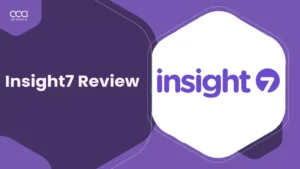
Insight7 is an AI-powered platform that specializes in analyzing interviews at scale, for example, focus group discussions, and in-depth interviews (IDIs). Its core features revolve around automating the analysis of interview data in form of video, audio, and text.
Its AI-powered capabilities extract insights, sentiment, and trends, which can be visualized into customizable categories aligned with business metrics. Users can activate these insights to make quality decisions, improve experiences, reduce churn, shape marketing/sales strategies, and drive other impactful actions.
Also, Insight7 offers features such as sentiment analysis, topic modeling, and conversation clustering to help researchers and organizations gain actionable insights from qualitative data.
- Key Features:
- Natural Language Processing (NLP): Utilizes machine learning algorithms to uncover insights, identify patterns, and extract key themes from text data.
- Sentiment Analysis & Topic Modeling: Helps researchers gain actionable insights from qualitative data.
- Theme Extraction: Extract recurring themes from multiple interviews through bulk upload of documents or URLs.
- Enterprise-Grade Security: Adheres to SOC 2 Type II and GDPR standards.
- Cloud Integration: Insight7 supports multiple data sources, such as Google Meet, Google Drive, and Microsoft Teams.
- Benefits
Insight7’s automation and comprehensive reporting capabilities make it a game-changer for businesses and researchers alike. It’s particularly well-suited for analyzing qualitative interviews in industries like marketing, healthcare, and academia.
- Use Cases:
- Automated research on large call transcript datasets.
- Enhancing customer experience by identifying friction points.
- Analyzing employee experience drivers for engagement and retention.
Extract insights from interviews, calls, surveys
and reviews for insights in minutes
2. MonkeyLearn
![]()
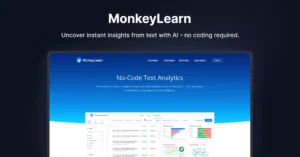
MonkeyLearn is an AI-powered platform that specializes in analyzing text data at scale, including documents, communications, and user-generated content. Its core features revolve around automating various natural language processing tasks.
It utilizes machine learning algorithms to perform text analysis capabilities like sentiment analysis, keyword extraction, topic modeling, and text classification. MonkeyLearn offers the ability to build custom trained models and access pre-built models for common use cases.
A key capability is allowing users to train custom machine learning models tailored to their specific text data and requirements. MonkeyLearn also provides integration options to incorporate text analysis insights into existing tools and workflows.
- Key Features:
- Text analysis capabilities like sentiment analysis, keyword extraction, topic modeling, and text classification.
- Custom-trained models and access to pre-built models for common use cases.
- Incorporate insights into existing workflows and tools.
- Benefits:
MonkeyLearn excels at providing flexibility, allowing users to build models that cater to their unique requirements. Its integration options make it a valuable tool for organizations looking to embed text analysis directly into their processes.
- Use Cases:
- Analyzing customer feedback data at scale.
- Categorizing support tickets/emails into topics.
- Monitoring brand perception from social media data.
3. RapidMiner

RapidMiner is an AI-powered platform that specializes in analyzing text data at scale. Its core features revolve around automating text mining and natural language processing tasks.
It utilizes machine learning algorithms to perform text analysis capabilities such as sentiment analysis, text classification, and clustering. RapidMiner offers a range of advanced analytics tools and techniques to help researchers and organizations extract insights, discover patterns, and make predictions from unstructured text data.
RapidMiner provides flexible options for automating repetitive tasks, creating reusable workflows, and orchestrating the analysis process. Users can configure the platform to map extracted insights to specific research objectives and streamline the analysis of interview data.
- Key Features:
- Sentiment analysis, text classification, and text clustering.
- User-friendly interface with drag-and-drop functionality.
- Create workflows that can be used repeatedly for similar tasks.
- Benefits:
RapidMiner is particularly suitable for businesses and researchers looking for a comprehensive solution to analyze interview transcripts and other forms of text data. Its flexibility makes it ideal for handling varied datasets.
- Use Cases:
- Analyzing customer feedback data and identifying sentiment trends.
- Categorizing support tickets or emails into topics using text classification.
- Monitoring brand perception from social media and user-generated content.
4. OpenAI GPT (Generative Pre-trained Transformer) Models
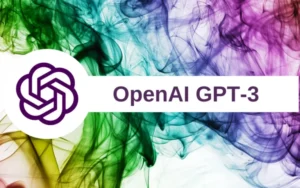
OpenAI’s GPT models are AI-powered platforms that can be fine-tuned to specialize in analyzing text data at scale, including interview transcripts from sources like focus group discussions and in-depth interviews (IDIs).
These models utilize advanced machine learning techniques to perform capabilities such as text summarization, question answering, sentiment analysis, and information extraction. GPT models leverage their contextual understanding and versatility to uncover insights, identify patterns, and extract key information from unstructured text data like interview transcripts.
One key capability is their ability to generate automatic summaries of lengthy transcripts, highlighting essential points and condensing content into concise overviews. Additionally, GPT models can be fine-tuned and customized for specific domains or use cases, potentially enhancing their performance in analyzing interview data.
These models offer scalability to process large volumes of transcript data efficiently, mapping extracted insights to research objectives. They can be fine-tuned and customized to integrate into existing workflows and analysis pipelines.
- Key Features:
- Text summarization, question answering, sentiment analysis, and information extraction.
- Generation of automatic summaries and concise content overviews.
- Fine-tune models for specific use cases.
- Benefits:
GPT models are versatile and scalable, making them suitable for businesses of all sizes. Their ability to generate summaries and answer specific questions enhances productivity and insight discovery.
- Use Cases:
- Summarizing customer interviews to identify pain points and improvement areas.
- Analyzing employee feedback transcripts to understand sentiment and drivers.
- Extracting key information from research interviews for qualitative analysis
Read: Chat Transcript Text Analysis: Practical Guide
5. Luminoso Analytics
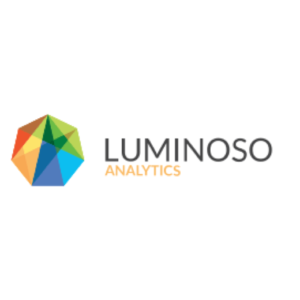
Luminoso is an AI-powered platform that specializes in analyzing unstructured text data at scale, including transcripts from focus group discussions and in-depth interviews (IDIs).
This tool utilizes natural language processing and machine learning techniques to perform text analysis tasks such as sentiment analysis, entity recognition, and theme extraction. It aims to uncover insights, identify trends, and extract actionable information from large volumes of text data, including interview transcripts.
A key capability of Luminoso is its ability to understand text in context by identifying concepts and relationships between words, enabling more accurate interpretation and analysis. It provides a user-friendly interface with visualizations, dashboards, and customizable reports to effectively explore and communicate text analysis findings.
It can be integrated into existing workflows and analytical pipelines, catering to use cases across various industries, such as customer experience management, market research, and brand monitoring.
- Key Features:
- Sentiment analysis, entity recognition, and theme extraction.
- Concept-based approach to text analytics for more accurate interpretation.
- Benefits:
Luminoso’s focus on contextual relationships and visual analytics makes it an excellent choice for researchers seeking deep insights. Its dashboards simplify the presentation of findings to stakeholders.
- Use Cases:
- Customer experience management and market research.
- Brand monitoring and sentiment analysis from social media.
Read:Transcript Analysis Software: Actionable Insights
Comparison Table: Quick Overview
| Tool | Best For | Key Features | Use Cases |
|---|---|---|---|
| Insight7 | End-to-end AI interview & transcript analysis | Bulk transcription, sentiment analysis, theme detection, secure reporting | Customer research, healthcare, academic & UX analysis |
| MonkeyLearn | Flexible, no-code text classification | Sentiment scoring, keyword extraction, custom ML model builder | Product reviews, brand monitoring, survey feedback |
| RapidMiner | Data scientists needing advanced NLP tools | Text clustering, predictive modeling, drag-and-drop analytics workflow | Support ticket tagging, feedback trend analysis |
| OpenAI GPT | Deep contextual interpretation | Summarization, emotion detection, open-ended Q&A | Long-form interview synthesis, employee engagement review |
| Luminoso | High-level thematic discovery | Concept mapping, automatic theme grouping, multilingual support | Brand sentiment tracking, customer experience insights |
Conclusion on AI transcript analysis tools
As organizations continue to seek ways to better understand and serve their customers, these AI transcript analysis tools offer a powerful suite of capabilities. From accurate transcription to insightful analysis, customer segmentation, effective data visualization, and impactful marketing content generation, the right AI transcript analysis tools can transform interview transcripts into a goldmine of actionable insights.
As we embrace the potential of these technologies, we’re not just streamlining processes—we’re empowering teams to make more informed, customer-centric decisions that drive success in an ever-evolving marketplace.
Analyze & Evaluate Calls. At Scale.

Frequently Asked Questions (FAQ)
What are AI tools for analyzing interview transcripts?
AI tools for analyzing interview transcripts are software platforms that use artificial intelligence techniques, such as natural language processing (NLP) and machine learning, to process and extract insights from unstructured text data. These tools can perform tasks like transcription, sentiment analysis, keyword extraction, summarization, and theme detection, automating what was traditionally a manual and time-consuming process.
Can AI tools handle multilingual transcripts?
Yes, many AI tools support multilingual capabilities. For instance, Sonix can transcribe and analyze text in over 40 languages, making it ideal for global projects. Similarly, platforms like RapidMiner and OpenAI GPT can process text in multiple languages depending on the configuration.
Are these AI tools secure for sensitive data?
Most leading AI tools prioritize security and compliance with data protection standards. For example, Insight7 offers enterprise-grade data security, ensuring encryption and privacy for sensitive information. Always check the security features of a tool before using it for confidential projects.
How accurate are AI transcription tools?
The accuracy of AI transcription tools depends on factors like audio quality, accents, and background noise. Tools such as Otter.ai and Sonix are known for their high accuracy rates, but for optimal results, it’s recommended to use clear audio recordings.



